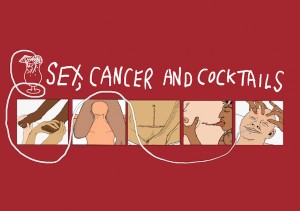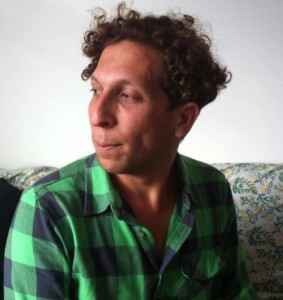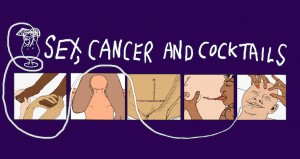Dorothy Max Prior weaves together reflections from Carran Waterfield in Manchester, Lisa Wolfe in Brighton, and artist/facilitator Brian Lobel to Sex, Cancer and Cocktails, an ‘in-home conversation about doing it during treatment’ which was presented at Sick! Festival 2015.
SICK! Festival, which for its 2015 incarnation ran in both Brighton and Manchester, is dedicated to ‘revealing and debating our most urgent physical, mental and social challenges’; exploring the medical, mental and social challenges of life and death and how we survive them (or don’t).’ The festival seeks out new ways of talking about and dealing with the bad times that are ‘unflinching, informed, irreverent and humane’.
So that’s the theory: how was it in practice? You’ll have noted a number of reviews from the festival posted here on Total Theatre, as well as Shame Shame Shame, a feature reflecting on the two shows that opened the Brighton leg of Sick! 2015 – Peter Ampe’s So You Can Feel and Christopher Green’s Prurience.
Also presented in Sick! was Brian Lobel’s Sex, Cancer and Cocktails, which has the sub-title ‘an in-home conversation about doing it during treatment…’ Exploring the unlikely pairing of cancer and pleasure, Sex, Cancer and Cocktails promised ‘a performance event mixing Sex Toy and Tupperware parties with expert information, intimate sharings and a radical perspective on illness and feeling (or not feeling) sexy.’ The show was presented in both Manchester and Brighton, each time in ‘a real person’s home’. As this was a show with a difference, and as reviewing something that involves real people sharing true life stories around an oft-distressing subject, we decided to try to find a different way to report on it. Total Theatre thought it would be interesting to get two writers’ points of view, one attending the Manchester show, and one seeing the piece a week later in Brighton…
But back first of all to Prurience. Christopher Green’s show courted controversy by playing with the format of a forum or self-help group that was providing a means of exploring health issues – in this case, addiction. Addiction to porn, specifically – but the artists’ interest was broader, reflecting on addiction generally; in the issue of the medicalisation of sexual behaviour (asking the question: is there really a problem with people watching porn?); and in the growing epidemic of self-help groups that don’t necessarily provide the right sort of help. The show was a clever blend of the real and the fictional – but although it pushed the boundaries of theatre to their furthest limits, it was undeniable a theatre show. It is interesting to note that during the post-show discussion, some of the audience members attending the Prurience showing in Brighton felt a little odd about discovering the degree of theatricality in the show.
In contrast, the lack of ‘theatricality’ in Sex, Cancer and Cocktails was interrogated by our Manchester writer Carran Waterfield. Let’s see what she had to say about her witnessing of the Manchester showing:
‘Sex, Cancer and Cocktails is presented by performer Brian Lobel in the guise of a house party. It joins the myriad of performance-lectures that Wellcome Trust public engagement grants have been generating in recent years, demonstrating how academic research and expert witnessing can sit comfortably and informatively alongside performance. Many shows now include the expert alongside the artist and some have been very successful with a seamless integration of the two. However, I wonder if some artists engaging with this genre rely wholly on the expert’s performance at the expense of some other magic that may elude them, thus side-lining the performer? Surely performance and lecture need some kind of mutual integration? This is where I feel Sex, Cancer and Cocktails falls short of its potential.
So without throwing the baby out with the bathwater, how can expert knowledge be written into performance effectively without losing the value of making a show for its own sake? The tension between performer expertise and specialist expertise is something that needs expert framing, perhaps directorial framing, for the successful tripartite marriage of audience interaction, performance content and academic contributions.
Those attending the event were mailed instructions, which involved seeking out a mystery venue, the location of which was embargoed until the day before the event. It turned out to be the front lounge of a gorgeously spacious house in a Manchester suburb. Part of the contract with the audience to secure admission (which was free) was by detailing experience of a personal connection with cancer by email. Audience participation is ‘gift aided’ in this way and becomes a vital contribution to making the evening work.
I was one of the first to arrive; bad thing to do at a party, but Brian is a very generous host. He offered me a Blood Drop Welcoming Shot – the first of three cocktails specifically commissioned for the event. Then he asked me to write a question I might want to ask about cancer and sex on a postcard and put it in his make-shift pick-n-mix cardboard box. It was anonymous, he said. The second postcard was for other questions I might have throughout the evening. This process was the first hint that the 45 minutes was going to be much longer than advertised. More people arrived and Brian repeated the interaction demonstrating all the anxiety of first-night nerves: constantly repeating himself, excitedly setting up more make-shift seats now doubling up as tables dotted with donated food offerings still in packets. To add to the coerced relaxation, other people helped him while he offered more drinks from plastic bottles and half-empty wine bottles and kept disappearing into the kitchen. In my experience at parties the kitchen is where the action is. He kept his guest presenters there while we were sitting in the lounge.
Brian tripped in and out of the lounge backwards and forwards and backwards again urging us to relax, assuring us that the fuzziness (referring to the alcohol and I guess the drugs for the cancer) would work its magic on us. He told us how excited he was that the notion of sex, cocktails and cancer should be given this opportunity to be laced together. With this he seemed to be winding into the event proper and finally, with a kind of flat fanfare, introduced his speakers for the evening who entered the lounge from the kitchen and to whom he capitulated for the rest of the evening more or less.
With their entrance came the intended start of the performance, some 30 minutes into the event. We were to ‘lucky dip’ our questions and read them aloud telling our names without identifying ourselves with the actual question we were reading. I suppose we became a self-help group through this exercise, while the experts sat almost opposite us as in a counselling session.
My lucky dip was: ‘How can you have energy left over for sex when your energy goes towards survival and your body is undergoing the upheaval of chemotherapy?’
Then, the show-and-tell proceeded with the presentations. First, Beth McCann, an Adolescent Haematology Clinical Nurse Specialist, gave a warm and engaging first-hand account of sex counselling sessions with young people, including the tensions and anxieties facing their parents, which was informative and well targeted to the age group. This was preceded by a detailed case study narrative given by Dr. Ali Mears, a Consultant Physician at St Mary’s Hospital, London.
Time for more cocktails: Needles and Spice (Rosemary Cordial, Prosecco and Vodka with Edible Glitter and Water), the effect of which was experienced during the next presentation from Professor Jackie Stacey from the Centre for the Study of Sexuality and Culture, University of Manchester. She gave a beautifully written autobiographical narrative outlining her ageing journey with cancer, written especially for the event.
The poignancy was broken as the cocktail took effect, with our host presenting himself as a blindfolded guinea pig for the concluding star turn, a Sex Toy Tupperware Party, presented by the charismatic sex-toy specialist Renée Denyer from Sh! From this point, most subtly, all the participants, academics and ‘lay people’, entered a giggling performance mode as Renée as shared her wares from a baby’s high chair in equally makeshift fashion; but Renée had a train to catch and the bubble was burst with her hasty departure, and the self-help continued with an earnest Q&A.
I left two hours later reflecting on an experiment in its early stages that may morph into something quite special to go beyond its reliance on a non-paying audience. I also wondered about the experts unwittingly clocking up public engagement outputs for their respective organisations.
But mostly I mused on where the performer is placed in these contexts? In morphing expert witness with camp bacchanal, there was potential to recreate the tradition of the drunken symposium. But in this case, were we in danger of side-lining, literally masking, the acknowledged ‘expert’-performer? I wondered about Lobel’s journey now towards mutually enriching performance moments as the piece develops.”
Without showing Brian Lobel either writers’ response to his show, I asked him if he had any reflection, as artist/creator and facilitator, on the difference between the Manchester and Brighton shows, and he had this to say:
“The major difference in the two shows was my personal time management: in Manchester times ran over significantly, and in Brighton things were much tighter, from a facilitation angle. I believe this did affect the overall performance in the space on the evening itself, but not in the overall impact of the piece. Because we ran over in Manchester, I followed up the next day with an email with further questions for panelists, and got lots of responses. Many had things they wanted to feed back, mostly very positive, and also a few did have burning questions they wished to ask the panelists, which they did via email. While it made the Manchester gig a bit less full-circle and warm and fuzzy on the evening, I feel very confident that people had a chance to engage fully.
The second time we created Sex, Cancer and Cocktails in Brighton it was very smooth, timings-wise. Because of this, most people were able to express themselves in the space. The same offer was made to audience members for follow up, but less took up this offer in Brighton – it appeared that most people got what they needed from the two hours.
If I could do it again, I would have loved to be stricter with times in Manchester, and to realise that, although people don’t come early to parties, they come early to performances… And this was a performance not a party.”
I did prime Brian a little bit on the question of ‘real life’ versus ‘performance’, mentioning that this had been raised as an issue, and he had this to say:
“Regarding the realness of the material, I’m not too worried about this critique. My performance work is currently about trying new forms of engagement which put people in unique situations and hopefully support them to learn, question, or participate in a new way. We ask people to contribute a thought about their relationship to cancer or sex before getting to the show in hopes of prepping them to participate. For these shows – unlike my other works – it is for a very particular audience member who I care to perform for/create with. I hope the performance, therefore, is in the rare gathering of people around a rare topic, a topic which lacks significant public representation (artistically as well as otherwise) but affects many.”
Let’s now see what Lisa Wolfe had to say about the show when it was presented a week or so later, in Brighton:
“We are gathered here together this evening to share and interrogate, to break taboos, to learn from experts and each from other. To drink, to laugh, to think, then drink some more. Bring your own nibbles.
It’s Tuesday evening and in a womb-coloured lounge in Brighton’s gay village sit thirty people – a mix of ages, gender and nationalities. Created and hosted by Brian Lobel, this curious, hybrid event comprises three sections, led by three key speakers, with a cocktail refresher in-between.
We hear sobering statistics and practicalities about cancer and sex from the eloquent Dr Ali Mears, Consultant Physician at St Mary’s Hospital and a key Sick! Festival contributor. Beth McCann (Adolescent Haematology Clinical Nurse Specialist) shares the advice she gives to young people undergoing cancer treatment, mainly about what not to do. ‘There’s chemo in cum’ says Beth, softly. Then Jessica Everitt from Lust Stores, who clearly enjoys her job, passes around some ‘intimate’ items explaining how they can be used, with particular reference to people who have undergone surgery or have a low sex drive. They are not currently available on the NHS, to the disappointment of some present. Come on Miliband – seize the day!
At the heart of the evening is Brian reading his sex and cancer timeline. It’s a funny, poignant and beautifully crafted five minutes of prose. Most of Brian’s work is based on his own experience, and whilst that can cloy, he uses his natural warmth and wit to draw an audience in. He is generous too, with his body and his spirit, collaborating broadly. Fun with Cancer Patients is one such project, and his show An Appreciation invited bed-side visitors (such as me) to fondle his remaining testicle wearing a variety of gloves (I got the Marigolds). Brian loves to talk about his body and he wants more people to talk about theirs – he wants us to be uncomfortable together.
But tonight there is no requirement for guests to open up about themselves or their experience to the room. We are asked to write a question about sex and/or cancer that we are too scared to ask and let someone else read it aloud, with little follow-up. We are encouraged to ask questions of the professionals and of each other. Over the course of two hours, lubricated by more specially designed cocktails, guests become friends and private becomes more public. A young woman tells me she is here because her nan, who raised her, died of ovarian cancer and no-one in her family will talk about it. Her story so mirrors mine it is humbling – twenty years on and similar attitudes prevail.
I suspect we all learn something, of sex and of cancer, of a stranger’s tale, or simply how many pistachio nuts one can eat without gagging. As a part of Sick! Festival and supported by The Wellcome Collection’s Sexology Season, the event makes sense; it’s well-intended, open-hearted and not afraid to talk dirty.”
As someone who didn’t see the show, I’m now trying to evaluate the issues raised from hearing other people’s points of view. The differences between Carran and Lisa’s reports tell a story of how different any show – but particularly a show relying so heavily on audience for the creation of the content – can be from one showing to another. Reflecting on what all three, both writers and the artist, have to say, shows us what a massive difference even a few days makes in the creation of work – and how work of this nature has to be ‘rehearsed’ with a live audience. The ‘script’ and dramaturgical structure can be planned beforehand, but you have to do it to know how to do it.
It also shows me something that as a writer and an editor I’ve long known: that a ‘review’ is ultimately a subjective response, no matter how it is framed. Both Carran and Lisa are highly experienced writers who are also (like all Total Theatre’s writers) directly involved and engaged with the making of performance work. Carran’s concerns go beyond the issues of timing and structure that are so obviously teething problems in the Manchester showing – she wonders about the very nature of the piece, in which there is little if any ‘performance’ by ‘performers’. This isn’t an issue for Lisa, who feels that the format is a success when witnessing the piece in Brighton. Neither is right or wrong – it’s just a different perspective. A reminder that ultimately any report-back on a performance is just that – one perspective.
Footnote:
Sex, Cancer and Cocktails was presented at Sick! Festival in Manchester and Brighton, supported by The Wellcome Collection as part of the Sexology Season.
Carran Waterfield saw the show at a Manchester home on 9 March 2015.
Lisa Wolfe saw it presented in a Brighton home on 18 March 2015.
Brian Lobel is a Wellcome Trust Public Engagement Fellow.
He was joined for Sex, Cancer and Cocktails by:
Dr. Ali Mears, Consultant Physician at St. Mary’s Hospital, Imperial College Healthcare NHS
Prof. Jackie Stacey, Centre for the Study of Sexuality & Culture, University of Manchester
Beth McCann, Adolescent Clinical Nurse Specialist.
For more on Sick! Festival, see http://www.sickfestival.com/
For more about Brian Lobel’s work, see www.blobelwarming.com
Featured image credit (top): illustration by James Barker




